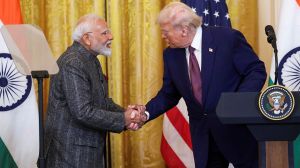Witless days
There was a time when electioneering was serious business. Decorum was observed, speeches sounded genuine and voices more sincerely so. Le...

There was a time when electioneering was serious business. Decorum was observed, speeches sounded genuine and voices more sincerely so. Leaders8217; oratorial skills were confined to the party8217;s agenda and fierce and passionate rhetoric natural to any contest or debate tugged at your heartstrings, activating the grey cells to make you ponder seriously the merits of the party you wished to vote for. Truth to tell, there wasn8217;t a potpourri of parties then, so much so, leaders could feel the pulse of the nation not of other parties and the people could, in turn, make out that here was a man or woman who understood his country and its people.
Today we have a plethora of parties throwing all reserve to the winds and marinating us for months in a spittly sea of talk. They promise; they feint; they sloganise; and unfortunately they take pot-shots at each other in such a vicious manner, that we have to stagger through this swarm of blather like ruined farmers in a cloud of locusts. The ability to offer facts couched in wit and a diplomatic cushion is gone 8212; instead, there8217;s been such a spate of politicians calling one another liars in public, that we have run out of credulity.
Obviously, the point of no return isn8217;t a concept that sits comfortably with most parties. No doubt there are a few good public figures 8212; but most seem to have made personal attacks a national agenda. One wishes they would, for a change, become their own worst8217; critics and keep their mind and mouth open at the same time. We have had leaders, and still have some, who are the quintessence of oratorial elegance and how marvellous it is to hear them.
Instead of political witch-hunting and constantly diminishing others in public, our political people would do well to look through the audience8217;s eyes and understand why it would be worth their while to deliver speeches straight and simple and at times laced with humour. This, however, seems to be something they eschew. When commitments and political visions get eclipsed, frivolity becomes the name of the game. What wouldn8217;t we all give to be able to sort out who8217;s actually telling the truth? Why can8217;t we hear the hidden mutterings of a speaker8217;s heart? Thanks to frequent elections, the nation has been treated to a constant garbage of vendetta campaigning 8212; so much so, even negative campaigning has reached a cul-de-sac.
Revenge is not a new concept. One is familiar with the Old Testament8217;s injunction of an eye for an eye8217;. History is replete with stories of power, the power-crazy, and how the balance of power is maintained by the threat of revenge. Our movies are also full of it 8212; Charles Bronson in Death Wish and a Dharmendra in Sholay. But these are vendetta of a passionate, bloody and physical kind.
Oral vendetta has become a political cult. Rivalries have often been exhibited in public ripostes, which at times can be hilarious. Winston Churchill was a master at this game. The verbal sparring between 19th century comparative anatomists Huxley and Ric-hard Owen was more of a personality clash than one over evo- lution. Both were giants in their field, but animosity sizzled when Darwin made Huxley his protege and mouthpiece. A miffed Owen pitted the grandiloquent and popular Bishop Wilberforce against Huxley during the famous open debate on evolution at the British Association meeting of 1860. Wilberforce brought down the house by asking Huxley whether he was descended from monkeys from his grandfather or grandmother8217;s side. Huxley retorted that he would much rather be descended from simians than from a bishop of the Church of England. This was a classic case of wit reinforcing rhetoric.
How one wishes our politicians would sharpen their speeches with the cutting edge of true wit. This way, laughter could be the best antidote for electioneering stress.
- 01
- 02
- 03
- 04
- 05































